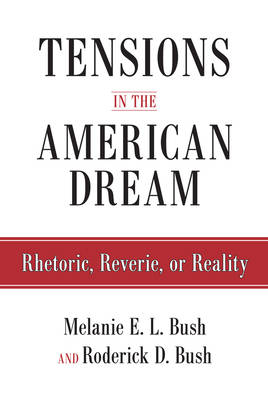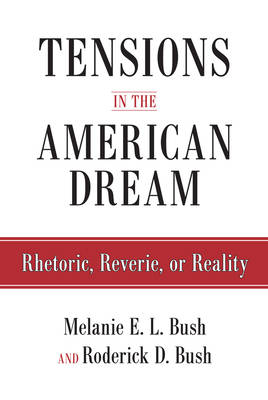
Nos liseuses Vivlio rencontrent actuellement des problèmes de synchronisation. Nous faisons tout notre possible pour résoudre ce problème le plus rapidement possible. Toutes nos excuses pour la gêne occasionnée !
- Retrait gratuit dans votre magasin Club
- 7.000.000 titres dans notre catalogue
- Payer en toute sécurité
- Toujours un magasin près de chez vous
Nos liseuses Vivlio rencontrent actuellement des problèmes de synchronisation. Nous faisons tout notre possible pour résoudre ce problème le plus rapidement possible. Toutes nos excuses pour la gêne occasionnée !
- Retrait gratuit dans votre magasin Club
- 7.000.0000 titres dans notre catalogue
- Payer en toute sécurité
- Toujours un magasin près de chez vous
Tensions in the American Dream
Rhetoric, Reverie, or Reality
Roderick Bush, Melanie E L Bush
Livre relié | Anglais
99,45 €
+ 198 points
Format
Description
Could the promise of upward mobility have a dark side? In Tensions in the American Dream, Melanie and Roderick Bush ask, how does a "nation of immigrants" pledge inclusion, yet marginalize so many citizens based on race, class, and gender? The authors consider the origins and development of the U.S. nation and empire; the founding principles of belonging, nationalism, and exceptionalism; and their lived reality. Tensions in the American Dream also addresses the relevancy of nation to empire in the context of the historical world capitalist system. The authors ask, is the American Dream a reality only questioned by those unwilling or unable to achieve it? What is the "good life" and how is it particularly "American"?
Spécifications
Parties prenantes
- Auteur(s) :
- Editeur:
Contenu
- Nombre de pages :
- 258
- Langue:
- Anglais
Caractéristiques
- EAN:
- 9781592138371
- Date de parution :
- 16-01-15
- Format:
- Livre relié
- Format numérique:
- Genaaid
- Dimensions :
- 178 mm x 231 mm
- Poids :
- 476 g







